- Home
- H. P. Lovecraft
Waking Up Screaming
Waking Up Screaming Read online
PRAISE FOR H. P. LOVECRAFT
“Lovecraft's fiction is one of the cornerstones of modern horror.”
—CLIVE BARKER
“H. P. Lovecraft has yet to be surpassed as the twentieth century's greatest practitioner of the classic horror tale.”
—STEPHEN KING
“Lovecraft's influenced people as diverse as Stephen King and Colin Wilson, Umberto Eco and John Carpenter. He's all over the cultural landscape…. Lovecraft is a resonating wave. He's rock and roll.”
—NEIL GAIMAN
“A master craftsman, Lovecraft brings compelling visions of nightmarish fear, invisible worlds, and the demons of the unconscious. If one author truly represents the very best in American literary horror, it is H. P. Lovecraft.”
—JOHN CARPENTER
“Reading Lovecraft is more than experiencing the creations of a bizarre and fitful mind through the medium of exquisite prose. It's far more chilling than that…. What you read is what he lived, and that's the scariest thing of all.”
—WALTER KOENIG
The H. P. Lovecraft editions from Del Rey Books
The Best of H. P. Lovecraft:
BLOODCURDLING TALES OF HORROR AND THE MACABRE
The Dream Cycle of H. P. Lovecraft: DREAMS OF TERROR AND DEATH
The Transition of H. P. Lovecraft: THE ROAD TO MADNESS
Other stories in the Lovecraftian World
H. P. Lovecraft and Others:
TALES OF THE CTHULHU MYTHOS
Stories Inspired by H. P. Lovecraft:
CTHULHU 2000
And also available:
WAKING UP SCREAMING
AT THE MOUNTAINS OF MADNESS
And Other Tales of Terror
THE TOMB
And Other Tales
SHADOWS OF DEATH
THE HORROR IN THE MUSEUM
Books published by The Random House Publishing Group
are available at quantity discounts on bulk purchases for
premium, educational, fund-raising, and special sales
use. For details, please call 1-800-733-3000.
“The oldest and strongest emotion of mankind is fear,
and the oldest and strongest kind of fear
is fear of the unknown.”
—H. P. LOVECRAFT
Contents
Being Providence: An Introduction to H. P. Lovecraft by Poppy Z. Brite
1. Cool Air
2. The Hound
3. The Lurking Fear
4. The Terrible Old Man
5. The Unnamable
6. Beyond the Wall of Sleep
7. The Shadow Over Innsmouth
8. The White Ship
9. The Outsider
10. Herbert West—Reanimator
11. Arthur Jermyn
12. The Moon-Bog
13. The Temple
14. Dagon
15. From Beyond
16. The Case of Charles Dexter Ward
Being Providence
An Introduction to H. P. Lovecraft
ONCE OR TWICE in every century we readers of weird fiction are blessed with a writer who changes the very course of the genre. In our time, certainly no one has done it since Stephen King. Before King, the last writer to do it was arguably H. P. Lovecraft. At the time of his death in 1937, his work had not been collected and was not even widely read. Today, thanks to the efforts of his friends August Derleth and Donald Wandrei, his influence extends over all of horror fiction. Even those sad writers who “don't have time to read” but count film as their primary inspiration—and there are far too many of them— cannot escape the bony hand of Lovecraft, evident in the work of weird filmmakers from John Carpenter and David Cronenberg to Daniel Myrick and Eduardo Sánchez.
Why, though? What allows a particular author to reach out and grab the zeitgeist? Though King and Lovecraft are two of my favorite writers, I don't think it is simply talent that makes them so quintessential to the genre. Rather, I believe that some quality in their work mirrors or accentuates changes in society, and in some small way even helps readers to deal with these changes. It's often been said that reading horror fiction is a way of rehearsing death, of flirting with our own mortality without going all the way. Depending on how much credence you give this theory, you may or may not agree that H. P. Lovecraft owes some of his posthumous popularity to a shell-shocked post–World War II readership trying to come to terms with the fact that the universe just didn't care about humanity as much as they had once believed.
The Lovecraftian scholar S. T. Joshi describes Lovecraft's philosophy of “cosmicism”—“the idea that, given the vastness of the universe both in space and in time, the human race (now no longer regarded as the special creation of a divine being) is of complete inconsequence in the universe-at-large[.]” Until the early twentieth century, though there were certainly divergent schools of thought, most Westerners believed that humankind was the dominant force in the world and had the right to use the world's resources as it saw fit. The Great Depression, Hitler, Stalin, Hiroshima, Zyklon-B, and other new atrocities delivered shattering blows to this perspective of divine right, already shaken by World War I. If this was where humanity's ascendance had led, perhaps it was time for humanity to be humbled.
Add ego to the philosophy of cosmicism and you're not too far from existentialism, which also took hold after World War II. Lovecraft, no egotist, had created not just a worldview but an entire universe-view in which humans were sometimes trifling insects, sometimes tools of Greater Powers, sometimes not even on the radar. Though various publishers spoke of collecting Lovecraft's stories during his lifetime, no Love-craft collection would exist until Derleth and Wandrei (as Arkham House) published The Outsider and Others in 1939, two years after his death. It sold very slowly, mostly to readers who already knew his work from Weird Tales and other pulp markets. In 1945 an Armed Services Edition paperback collection, The Dunwich Horror and Other Weird Tales, was released, and was quite widely distributed. Love-craft's work gained popularity over the next two decades, and in the early 1970s, Ballantine Books began reissuing his entire oeuvre in paperback. Whether or not one feels that the theory of cosmicism became more palatable in the second half of the twentieth century, it seems obvious that there was a time for Lovecraft to capture the popular imagination, and that time—sadly—did not come while he was alive.
It's ironic to think of H. P. Lovecraft as a writer ahead of his time, for he despised—or affected to despise—all things modern. A genteel poseur of his day, he felt uncomfortable existing in the twentieth century and wished to live in Colonial days, affecting the attitudes of an eighteenth-century English Tory and professing loyalty to King George the Third. Later in life he was able to see the good qualities of other eras—“If I could create an ideal world,” he wrote, “it would be an England with the fire of the Elizabethans, the correct taste of the Georgians, and the refinement and pure ideals of the Victorians”—but seldom of his own day and age. He refused even to buy a modern suit until the style he was used to grew so obsolete that he could no longer find it.
Except for a brief sojourn in New York, Lovecraft always made his home in Providence, one of those cities where the past seems separated from the present by a very thin veil. In his fiction he traveled to exotic earthly lands (some more convincingly imagined than others) and explored realms never imagined by any other human, but even in his fiction it is Providence he loves best. In one of his few long works, “The Case of Charles Dexter Ward,” the protagonist's first memories are of “the great westward sea of hazy roofs and domes and steeples and far hills which he saw one winter afternoon from that great railed embankment, all violet and mystic against a fevered apocalyptic sunset of reds and golds and p
urples and curious greens.” Later, he roams “older and quainter levels of the ancient city … down vertical Jenckes Street with its back walls and Colonial gables to the shady Benefit Street corner … it was getting to be a slum here, but the titan elms cast a restoring shadow over the place, and the boy used to stroll south past the long lines of pre-Revolutionary homes with their great central chimneys and classic portals … the young Charles could picture them as they were when the street was new, and red heels and peri-wigs set off the painted pediments whose signs of wear were now becoming so visible.”
It seems fitting, then, that the epitaph on Lovecraft's tomb-stone reads simply, “I am Providence.” He certainly captured the essence of the city, and carried its essence within him; but the dictionary also defines providence as “foresight.” Though he may not have intended it, Lovecraft gave future readers a new way of reading weird fiction and a new way of imagining the universe. Absolutely he is Providence in every sense of the word.
—POPPY Z. BRITE, New Orleans, June 2002
Cool Air
YOU ASK ME to explain why I am afraid of a draught of cool air; why I shiver more than others upon entering a cold room, and seem nauseated and repelled when the chill of evening creeps through the heat of a mild autumn day. There are those who say I respond to cold as others do to a bad odour, and I am the last to deny the impression. What I will do is to relate the most horrible circumstance I ever encountered, and leave it to you to judge whether or not this forms a suitable explanation of my peculiarity.
It is a mistake to fancy that horror is associated inextricably with darkness, silence, and solitude. I found it in the glare of midafternoon, in the clangour of a metropolis, and in the teaming midst of a shabby and commonplace rooming-house with a prosaic landlady and two stalwart men by my side. In the spring of 1923 I had secured some dreary and unprofitable magazine work in the city of New York; and being unable to pay any substantial rent, began drifting from one cheap boarding establishment to another in search of a room which might combine the qualities of decent cleanliness, endurable furnishings, and very reasonable price. It soon developed that I had only a choice between different evils, but after a time I came upon a house in West Fourteenth Street which disgusted me much less than the others I had sampled.
The place was a four-story mansion of brownstone, dating apparently from the late forties, and fitted with woodwork and marble whose stained and sullied splendour argued a descent from high levels of tasteful opulence. In the rooms, large and lofty, and decorated with impossible paper and ridiculously ornate stucco cornices, there lingered a depressing mustiness and hint of obscure cookery; but the floors were clean, the linen tolerably regular, and the hot water not too often cold or turned off, so that I came to regard it as at least a bearable place to hibernate till one might really live again. The landlady, a slatternly, almost bearded Spanish woman named Herrero, did not annoy me with gossip or with criticisms of the late-burning electric light in my third-floor front hall room; and my fellow-lodgers were as quiet and un-communicative as one might desire, being mostly Spaniards a little above the coarsest and crudest grade. Only the din of street cars in the thoroughfare below proved a serious annoyance.
I had been there about three weeks when the first odd incident occurred. One evening at about eight I heard a spattering on the floor and became suddenly aware that I had been smelling the pungent odour of ammonia for some time. Looking about, I saw that the ceiling was wet and dripping; the soaking apparently proceeding from a corner on the side toward the street. Anxious to stop the matter at its source, I hastened to the basement to tell the landlady; and was assured by her that the trouble would quickly be set right.
“Doctair Muñoz,” she cried as she rushed upstairs ahead of me, “he have speel hees chemicals. He ees too seeck for doctair heemself—seecker and seecker all the time—but he weel not have no othair for help. He ees vairy queer in hees seeckness—all day he take funnee-smelling baths, and he cannot get excite or warm. All hees own housework he do— hees leetle room are full of bottles and machines, and he do not work as doctair. But he was great once—my fathair in Barcelona have hear of heem—and only joost now he feex a arm of the plumber that get hurt of sudden. He nevair go out, only on roof, and my boy Esteban he breeng heem hees food and laundry and mediceens and chemicals. My Gawd, the sal-ammoniac that man use for keep heem cool!”
Mrs. Herrero disappeared up the staircase to the fourth floor, and I returned to my room. The ammonia ceased to drip, and as I cleaned up what had spilled and opened the window for air, I heard the landlady's heavy footsteps above me. Dr. Muñoz I had never heard, save for certain sounds as of some gasoline-driven mechanism; since his step was soft and gentle. I wondered for a moment what the strange affliction of this man might be, and whether his obstinate refusal of outside aid were not the result of a rather baseless eccentricity. There is, I reflected tritely, an infinite deal of pathos in the state of an eminent person who has come down in the world.
I might never have known Dr. Muñoz had it not been for the heart attack that suddenly seized me one forenoon as I sat writing in my room. Physicians had told me of the danger of those spells, and I knew there was no time to be lost; so remembering what the landlady had said about the invalid's help of the injured workman, I dragged myself upstairs and knocked feebly at the door above mine. My knock was answered in good English by a curious voice some distance to the right, asking my name and business; and these things being stated, there came an opening of the door next to the one I had sought.
A rush of cool air greeted me; and though the day was one of the hottest of late June, I shivered as I crossed the threshold into a large apartment whose rich and tasteful decoration surprised me in this nest of squalor and seediness. A folding couch now filled its diurnal role of sofa, and the mahogany furniture, sumptuous hangings, old paintings, and mellow bookshelves all bespoke a gentleman's study rather than a boarding-house bedroom. I now saw that the hall room above mine—the “leetle room” of bottles and machines which Mrs. Herrero had mentioned—was merely the laboratory of the doctor; and that his main living quarters lay in the spacious adjoining room whose convenient alcoves and large contiguous bathroom permitted him to hide all dressers and obtrusively utilitarian devices. Dr. Muñoz, most certainly, was a man of birth, cultivation, and discrimination.
The figure before me was short but exquisitely proportioned, and clad in somewhat formal dress of perfect cut and fit. A high-bred face of masterful though not arrogant expression was adorned by a short iron-grey full beard, and an old-fashioned pince-nez shielded the full, dark eyes and surmounted an aquiline nose which gave a Moorish touch to a physiognomy otherwise dominantly Celtiberian. Thick, well-trimmed hair that argued the punctual calls of a barber was parted gracefully above a high forehead; and the whole picture was one of striking intelligence and superior blood and breeding.
Nevertheless, as I saw Dr. Muñoz in that blast of cool air, I felt a repugnance which nothing in his aspect could justify. Only his lividly inclined complexion and coldness of touch could have afforded a physical basis for this feeling, and even these things should have been excusable considering the man's known invalidism. It might, too, have been the singular cold that alienated me; for such chilliness was abnormal on so hot a day, and the abnormal always excites aversion, distrust, and fear.
But repugnance was soon forgotten in admiration, for the strange physician's extreme skill at once became manifest despite the ice-coldness and shakiness of his bloodless-looking hands. He clearly understood my needs at a glance, and ministered to them with a master's deftness; the while reassuring me in a finely modulated though oddly hollow and timbreless voice that he was the bitterest of sworn enemies to death, and had sunk his fortune and lost all his friends in a lifetime of bizarre experiment devoted to its bafflement and extirpation. Something of the benevolent fanatic seemed to reside in him, and he rambled on almost garrulously as he sounded my chest and mixed a suitable draught o
f drugs fetched from the smaller laboratory room. Evidently he found the society of a well-born man a rare novelty in this dingy environment, and was moved to unaccustomed speech as memories of better days surged over him.
His voice, if queer, was at least soothing; and I could not even perceive that he breathed as the fluent sentences rolled urbanely out. He sought to distract my mind from my own seizure by speaking of his theories and experiments; and I remember his tactfully consoling me about my weak heart by insisting that will and consciousness are stronger than organic life itself, so that if a bodily frame be but originally healthy and carefully preserved, it may through a scientific enhancement of these qualities retain a kind of nervous animation despite the most serious impairments, defects, or even absences in the battery of specific organs. He might, he half jestingly said, some day teach me to live—or at least to possess some kind of conscious existence—without any heart at all! For his part, he was afflicted with a complication of maladies requiring a very exact regimen which included constant cold. Any marked rise in temperature might, if prolonged, affect him fatally; and the frigidity of his habitation— some 55 or 56 degrees Fahrenheit—was maintained by an absorption system of ammonia cooling, the gasoline engine of whose pumps I had often heard in my own room below.
Relieved of my seizure in a marvellously short while, I left the shivery place a disciple and devotee of the gifted recluse. After that I paid him frequent overcoated calls; listening while he told of secret researches and almost ghastly results, and trembling a bit when I examined the unconventional and astonishingly ancient volumes on his shelves. I was eventually, I may add, almost cured of my disease for all time by his skillful ministrations. It seems that he did not scorn the incantations of the mediaevalists, since he believed these cryptic formulae to contain rare psychological stimuli which might conceivably have singular effects on the substance of a nervous system from which organic pulsations had fled. I was touched by his account of the aged Dr. Torres of Valencia, who had shared his earlier experiments and nursed him through the great illness of eighteen years before, whence his present disorders proceeded. No sooner had the venerable practitioner saved his colleague than he himself succumbed to the grim enemy he had fought. Perhaps the strain had been too great; for Dr. Muñoz made it whisperingly clear—though not in detail—that the methods of healing had been most extraordinary, involving scenes and processes not welcomed by elderly and conservative Galens.

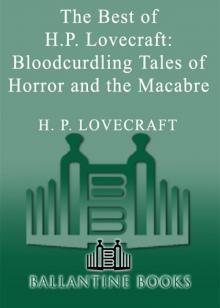 The Best of H.P. Lovecraft
The Best of H.P. Lovecraft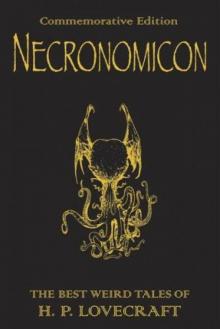 The Definitive H.P. Lovecraft: 67 Tales Of Horror In One Volume
The Definitive H.P. Lovecraft: 67 Tales Of Horror In One Volume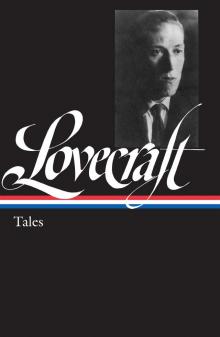 The Complete Works of H.P. Lovecraft
The Complete Works of H.P. Lovecraft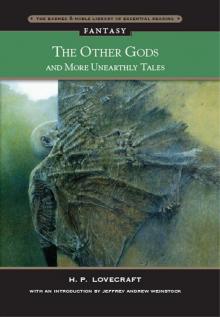 Other Gods and More Unearthly Tales
Other Gods and More Unearthly Tales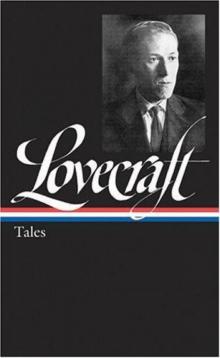 Lovecraft's Fiction Volume I, 1905-1925
Lovecraft's Fiction Volume I, 1905-1925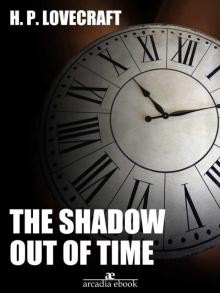 The Shadow Out of Time
The Shadow Out of Time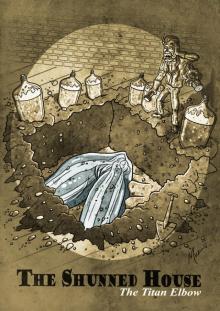 The Shunned House
The Shunned House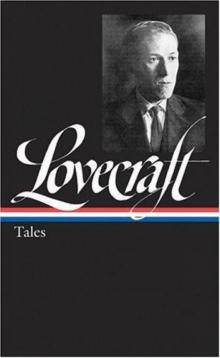 Lovecraft's Fiction Volume II, 1926-1928
Lovecraft's Fiction Volume II, 1926-1928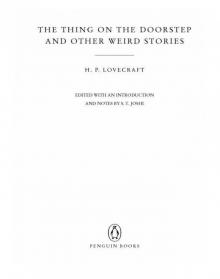 The Thing on the Doorstep and Other Weird Stories
The Thing on the Doorstep and Other Weird Stories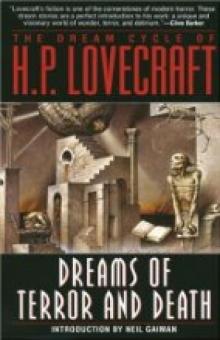 Dream Cycle of H. P. Lovecraft: Dreams of Terror and Death
Dream Cycle of H. P. Lovecraft: Dreams of Terror and Death Great Tales of Horror
Great Tales of Horror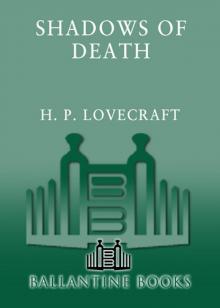 Shadows of Death
Shadows of Death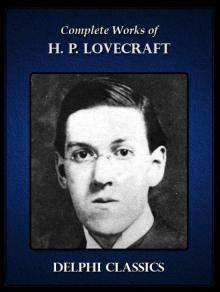 Delphi Complete Works of H. P. Lovecraft (Illustrated)
Delphi Complete Works of H. P. Lovecraft (Illustrated)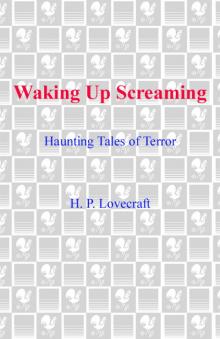 Waking Up Screaming: Haunting Tales of Terror
Waking Up Screaming: Haunting Tales of Terror H.P. Lovecraft Goes to the Movies
H.P. Lovecraft Goes to the Movies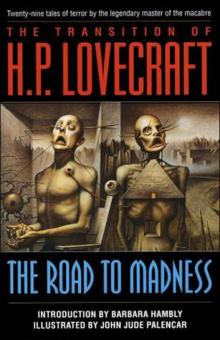 The Road to Madness
The Road to Madness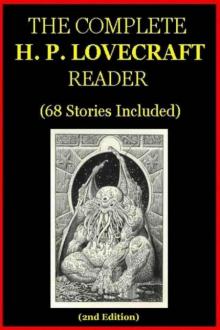 The Complete H.P. Lovecraft Reader (68 Stories)
The Complete H.P. Lovecraft Reader (68 Stories)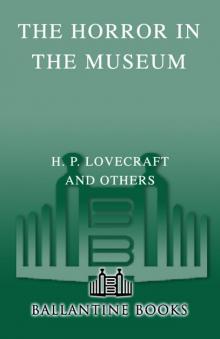 The Horror in the Museum
The Horror in the Museum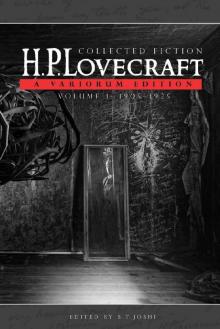 Collected Fiction Volume 1 (1905-1925): A Variorum Edition
Collected Fiction Volume 1 (1905-1925): A Variorum Edition Lovecrafts_Fiction, vol.I_1905-1925
Lovecrafts_Fiction, vol.I_1905-1925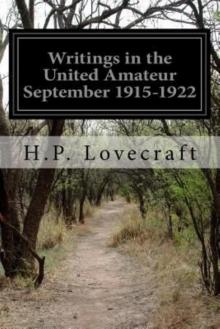 Writings in the United Amateur, 1915-1922
Writings in the United Amateur, 1915-1922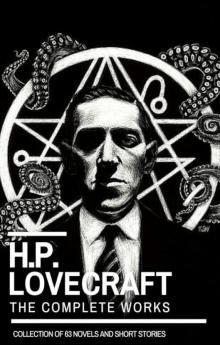 H.P. Lovecraft: The Complete Works
H.P. Lovecraft: The Complete Works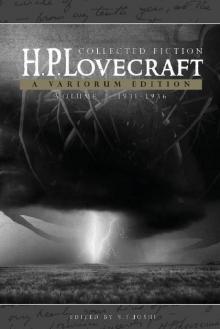 Collected Fiction Volume 3 (1931-1936): A Variorum Edition
Collected Fiction Volume 3 (1931-1936): A Variorum Edition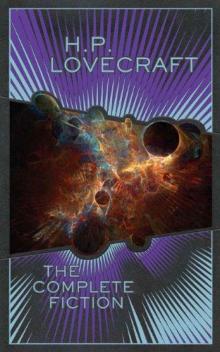 H.P. Lovecraft: The Complete Fiction
H.P. Lovecraft: The Complete Fiction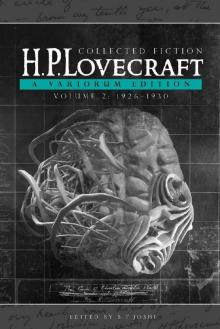 Collected Fiction Volume 2 (1926-1930): A Variorum Edition
Collected Fiction Volume 2 (1926-1930): A Variorum Edition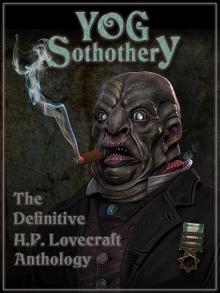 Yog Sothothery - The Definitive H.P. Lovecraft Anthology
Yog Sothothery - The Definitive H.P. Lovecraft Anthology The Complete H.P. Lovecraft Collection (Xist Classics)
The Complete H.P. Lovecraft Collection (Xist Classics)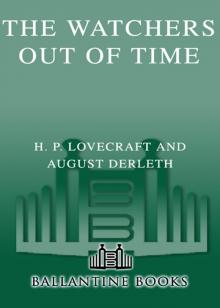 The Watchers Out of Time
The Watchers Out of Time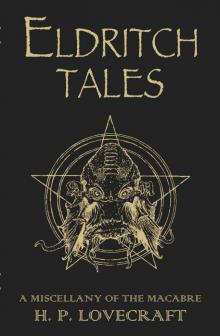 Eldritch Tales
Eldritch Tales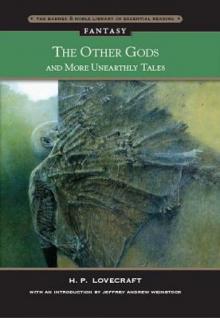 The Other Gods And More Unearthly Tales
The Other Gods And More Unearthly Tales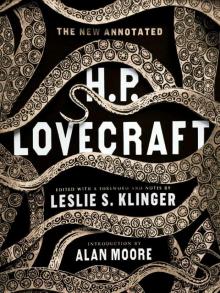 The New Annotated H. P. Lovecraft
The New Annotated H. P. Lovecraft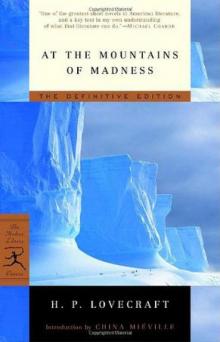 At the mountains of madness
At the mountains of madness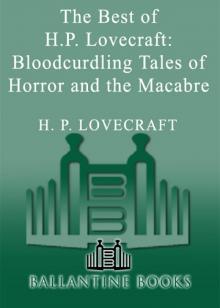 Bloodcurdling Tales of Horror and the Macabre
Bloodcurdling Tales of Horror and the Macabre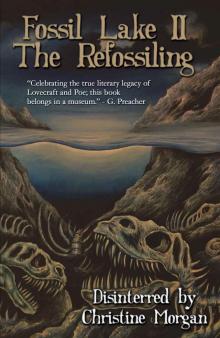 Fossil Lake II: The Refossiling
Fossil Lake II: The Refossiling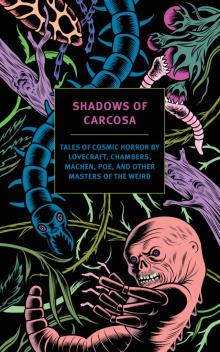 Shadows of Carcosa: Tales of Cosmic Horror by Lovecraft, Chambers, Machen, Poe, and Other Masters of the Weird
Shadows of Carcosa: Tales of Cosmic Horror by Lovecraft, Chambers, Machen, Poe, and Other Masters of the Weird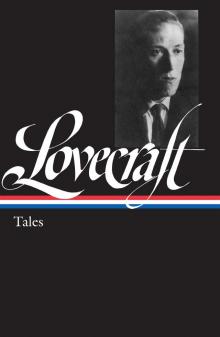 H. P. Lovecraft
H. P. Lovecraft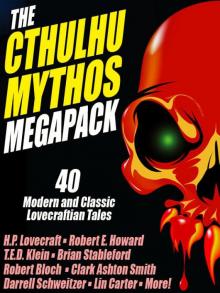 The Cthulhu Mythos Megapack
The Cthulhu Mythos Megapack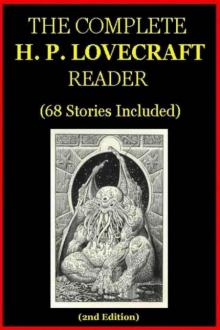 The Complete H. P. Lovecraft Reader (2nd Edition)
The Complete H. P. Lovecraft Reader (2nd Edition)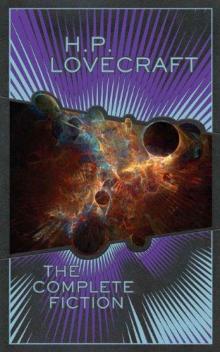 The Complete Fiction
The Complete Fiction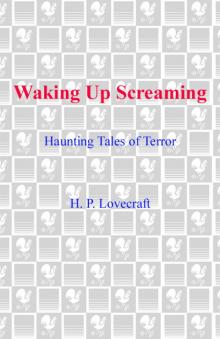 Waking Up Screaming
Waking Up Screaming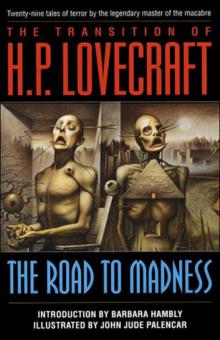 Transition of H. P. Lovecraft
Transition of H. P. Lovecraft![[1935] The Shadow Out of Time Read online](http://i1.bookreadfree.com/i2/04/12/1935_the_shadow_out_of_time_preview.jpg) [1935] The Shadow Out of Time
[1935] The Shadow Out of Time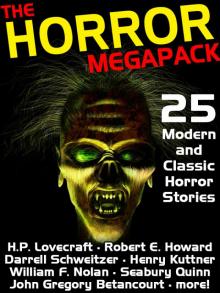 The Horror Megapack
The Horror Megapack